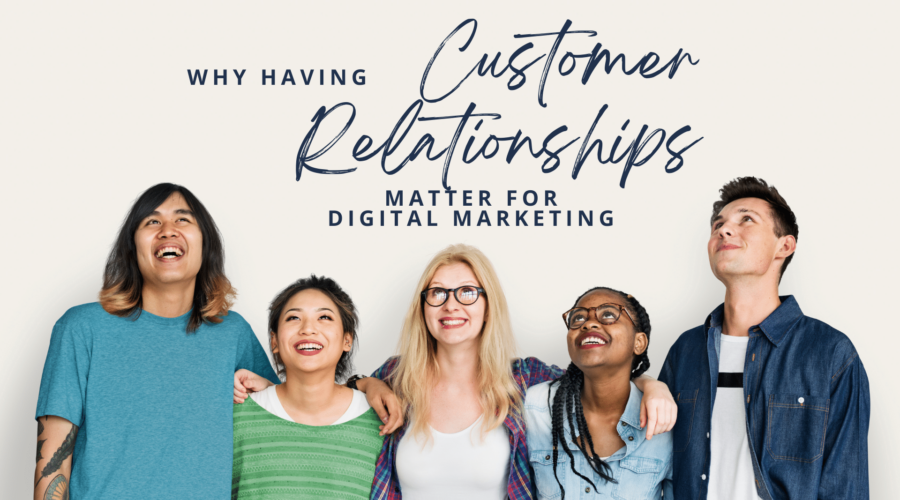In the world of digital marketing, it’s easy to view Customer Relationship Management (CRM) and Search Engine Optimization (SEO) as two different planets. CRM focuses on nurturing customer relationships and enhancing their experience, while SEO is all about boosting your website’s visibility on search engines. You might wonder, what’s the connection? Well, in this article, we’ll show you how CRM indirectly boosts your Santa Monica SEO efforts and why this partnership is a game-changer for your business.
Getting to Know Your Customers Better
First things first, CRM is a goldmine for understanding your customers. It collects essential data like their age, preferences, and what they’ve bought. But how does this help with SEO?
Well, when you know your customers like the back of your hand, you can create content that speaks directly to their needs. You can find the keywords they use and craft content that answers their questions. This not only pleases your visitors but also puts a smile on Google’s face, which means better rankings for your website. Let’s explore its importance in-depth below:
Understanding Your Audience’s Search Behavior: CRM data goes beyond surface-level information. It delves into your audience’s search behavior, revealing the specific keywords and phrases they use when seeking information related to your products or services. This insight allows you to align your SEO strategy with the actual language your potential customers use, enhancing your chances of appearing in their search results. By understanding the nuances of your audience’s search behavior, you can create content that resonates with their needs, ultimately driving more organic traffic to your website.
Tailoring Content to Address Customer Needs: Armed with a comprehensive understanding of your customers, you can tailor your content to directly address their needs, pain points, and preferences. This tailoring process isn’t limited to just keywords; it extends to the entire content creation process. You can develop blog posts, articles, product descriptions, and landing pages that not only include the relevant keywords but also provide valuable solutions and answers to the questions your customers may have. This customer-centric approach significantly boosts user engagement and trust, as visitors find exactly what they’re looking for on your website.
Keyword Research and CRM Integration: Integrating CRM data into your keyword research process is a powerful synergy. Instead of relying solely on keyword research tools, you can validate and refine your keyword strategy based on the actual language used by your customers. CRM data acts as a compass, guiding you towards keywords that are not only relevant but also resonate with your target audience. This results in a more organic and genuine approach to SEO, as your keywords are rooted in real customer interactions and preferences.
Crafting Content that Speaks to Your Audience: Content creation is the heart of any SEO strategy. With CRM insights, you’re not just creating content blindly; you’re crafting it with a clear understanding of your audience’s preferences, pain points, and interests. This not only makes your content more relevant but also positions your website as an authoritative source of information in your industry. As Google’s algorithms become increasingly sophisticated, they reward websites that provide valuable, customer-centric content with higher rankings in search results.
Delighting Google with User-Centric Content: Google’s ultimate goal is to provide the best possible user experience to its search engine users. By creating content that directly addresses your customers’ needs and using keywords that resonate with them, you’re essentially serving the same purpose as Google. Search engines recognize this alignment and reward it with higher rankings. When users find content that fulfills their needs and expectations, they are more likely to engage with your website, spend more time on it, and convert into customers. This not only pleases your visitors but also puts a smile on Google’s face, ultimately resulting in better rankings for your website.
In essence, getting to know your customers better through CRM isn’t just a strategic move for building stronger relationships; it’s a powerful lever for enhancing your SEO performance. It ensures that your content is not only optimized for search engines but, more importantly, resonates with the real people behind those search queries. This alignment creates a win-win scenario where both your audience and search engines recognize the value you provide, leading to improved organic traffic, higher rankings, and, ultimately, greater success for your Santa Monica business.
Creating a Personal Touch
CRM systems allow you to personalize your customer interactions through emails, social media, and more. Why is personal touch so crucial for your Santa Monica SEO strategy? Let’s delve into the intricacies of this relationship and why it matters:
Customer-Centric Engagement: CRM systems enable businesses to segment their customer data effectively. These segments are not just anonymous groups; they represent real individuals with distinct preferences, behaviors, and needs. By recognizing and respecting these differences, you can tailor your engagement to match what each segment seeks. This customer-centric approach ensures that your interactions, whether through emails, social media, or other communication channels, resonate with the unique needs of each group. This level of relevance builds trust and loyalty, creating a more meaningful connection between your business and your customers.
User Engagement and SEO: Now, you might wonder how this personalized engagement connects with SEO. The answer lies in the realm of user engagement. User engagement is a multifaceted metric that search engines use to gauge the quality of your website and its content. When users find your content engaging and relevant, they stay longer on your website, click on more pages, and are more likely to convert. These behaviors are all signals to search engines that your website offers value and should be ranked higher.
Lower Bounce Rates: A personal touch in your interactions can significantly reduce bounce rates. Bounce rate is a metric that reflects the percentage of visitors who leave your website after viewing only one page. High bounce rates are often associated with content that doesn’t meet user expectations or resonate with their needs. With CRM-driven personalization, you can create content that aligns with the specific interests of your customer segments, reducing the chances of visitors bouncing away. Lower bounce rates are seen favorably by search engines, as they indicate that your website provides content that holds users’ attention.
Higher Conversion Rates: Personalized engagement is closely linked to higher conversion rates. When users feel that your content speaks directly to their needs and preferences, they are more likely to take the desired actions, such as making a purchase, filling out a contact form, or subscribing to your newsletter. These conversions not only directly impact your business’s bottom line but also have a positive effect on your SEO. Search engines view high conversion rates as a sign of user satisfaction, which, in turn, boosts your website’s rankings.
Social Signals and Brand Advocacy: Personalized customer interactions often extend to social media. By engaging with your customers on social platforms in a personalized and meaningful way, you encourage them to become brand advocates. They are more likely to like, share, and comment on your content, amplifying your brand’s reach and visibility. These social signals indirectly impact your SEO by generating valuable backlinks, increasing your brand’s online presence, and enhancing your authority in your industry.
Building Trust and Authority: Trust is a fundamental component of both customer relationships and SEO success. Personalization, by catering to individual customer needs and preferences, builds trust. When your customers trust your business, they are more likely to engage with your website, share your content, and refer your business to others. These actions have a cascading effect on your SEO. Trust signals from users, such as repeat visits, content sharing, and referrals, contribute to higher search engine rankings, as search engines consider trustworthiness and authority as key ranking factors.
In summary, creating a personal touch in your customer interactions through CRM is not just about fostering stronger relationships; it’s a strategic move that significantly impacts your SEO performance. The alignment of personalized customer engagement with SEO objectives leads to lower bounce rates, higher conversion rates, increased user engagement, more social signals, and the development of trust and authority. All of these factors work in harmony to improve your website’s organic traffic, search rankings, and, ultimately, your Santa Monica business’s long-term success.
Improving the User Experience
User experience, often abbreviated as UX, is a cornerstone of modern SEO. Google and other search engines prioritize websites that offer a seamless, user-friendly experience to their visitors. This includes ensuring that your website looks great on any device, is easy to navigate, and loads at lightning speed. But how does Customer Relationship Management (CRM) play a critical role in enhancing the user experience and, in turn, boosting your SEO ranking? Let’s explore this symbiotic relationship:
- Responsive Design and Device Compatibility: In today’s digital landscape, users access websites from a myriad of devices, including smartphones, tablets, laptops, and desktop computers. For SEO, it’s essential that your website is responsive and adapts to various screen sizes and resolutions. Google rewards mobile-friendly websites with higher rankings, as it ensures a better experience for a substantial portion of users.
CRM’s Role: CRM can indirectly influence your website’s mobile-friendliness. By collecting and analyzing customer data, you gain insights into the devices and platforms your customers use to access your website. This information can guide your web development and design efforts, helping you tailor your site’s layout and functionality to match your customers’ preferences, which enhances user experience and SEO performance.
- Ease of Navigation and Customer Satisfaction: A well-structured website with intuitive navigation not only pleases users but also search engines. Users should be able to find what they’re looking for quickly and easily. If your website is confusing to navigate, users are likely to leave, contributing to higher bounce rates and negatively impacting your SEO ranking.
CRM’s Role: CRM systems can contribute to improved navigation by streamlining customer support processes. When customer inquiries are handled efficiently and effectively, users are more likely to stay on your website. CRM can also inform your site’s structure based on the types of information and support your customers commonly seek. This, in turn, leads to a more intuitive and user-friendly website, which is appreciated by both users and search engines.
- Fast Loading Times and User Satisfaction: Website speed is a critical factor for both UX and SEO. Slow-loading pages can frustrate users and lead to higher bounce rates. Google rewards websites that load quickly with higher rankings because it ensures a smoother experience for search engine users.
CRM’s Role: CRM can indirectly influence website speed by improving customer service. When CRM processes are streamlined, customer inquiries are addressed promptly, reducing the likelihood of frustrated users leaving your site due to slow response times. Additionally, CRM data can help identify common customer pain points or bottlenecks on your website, allowing you to optimize these areas for faster loading times and a more seamless user experience.
- Improved Customer Support: Providing top-notch customer service is a priority for any business. Happy customers are more likely to become repeat customers and brand advocates. CRM systems can centralize customer support inquiries and streamline responses, resulting in more efficient and effective support.
CRM’s Role: Effective customer support, facilitated by CRM, leads to satisfied customers. Satisfied customers are more likely to engage with your website, explore your products or services, and share their positive experiences. This increased user engagement positively impacts SEO, as search engines interpret longer time spent on your site and lower bounce rates as signals of a high-quality user experience.
In conclusion, the relationship between CRM and SEO goes beyond managing customer relationships and enhancing user experience. CRM indirectly supports SEO by contributing to a better user experience, which search engines reward with higher rankings. A responsive design, easy navigation, fast loading times, and efficient customer support all play a role in ensuring your website is user-friendly. Happy users stay longer on your site, engage more, and ultimately boost your SEO ranking, leading to more organic traffic and improved visibility for your Santa Monica business.
The Power of Positive Online Reviews
In the digital age, the influence of online reviews cannot be overstated. Positive reviews act as a powerful currency, building trust with potential customers and influencing their decisions. Moreover, the impact of these reviews extends to your Santa Monica SEO strategy. Let’s explore how CRM systems and their role in managing customer feedback and reviews can effectively bolster your online reputation and, consequently, give your SEO performance a significant boost.
The Significance of Positive Online Reviews:
In today’s online landscape, consumers often turn to reviews to assess the credibility and trustworthiness of a business. Positive reviews act as social proof, demonstrating that your products or services have satisfied previous customers. This not only instills confidence in potential customers but also sets a positive first impression, often leading to higher conversion rates and increased business.
For SEO, the role of online reviews is two-fold. Firstly, search engines, particularly Google, value online reviews as a ranking factor. Businesses with a substantial number of positive reviews tend to rank higher in local search results. This is especially pertinent for businesses with a local presence in Santa Monica, as local SEO relies heavily on factors like online reviews.
CRM’s Role in Managing Customer Feedback:
CRM systems are instrumental in managing customer feedback and reviews effectively. They provide a centralized platform for collecting and analyzing customer reviews, whether they are posted on your website, social media, review sites, or other online platforms. This centralized data helps you gain a comprehensive understanding of your online reputation.
Through CRM, you can actively monitor reviews as they are posted. This real-time monitoring ensures that you can promptly respond to customer feedback, addressing both positive and negative comments. By responding to reviews, you demonstrate your commitment to customer satisfaction and engagement. This level of interaction reflects positively on your brand and can lead to improved sentiment and customer trust.
Improving Your Online Reputation:
When you actively engage with customer reviews, especially negative ones, you have an opportunity to rectify issues and turn detractors into advocates. By addressing concerns and providing resolutions, you not only show your dedication to customer service but also transform negative experiences into positive ones. Customers appreciate this level of attention and responsiveness, which can lead to increased loyalty and trust in your brand.
As you actively manage your online reputation through CRM, you are essentially curating a collection of positive reviews that reflect well on your business. Over time, this collection of positive feedback serves as a valuable asset, influencing the purchasing decisions of potential customers and improving your credibility.
SEO and the Impact of Online Reviews:
From an SEO perspective, positive online reviews contribute to higher search engine rankings. Google and other search engines interpret positive reviews as signals of trust and authority. Websites with a higher number of positive reviews are seen as more reputable, which results in improved rankings.
Additionally, online reviews can contribute to SEO in the context of local search. Local businesses in Santa Monica can particularly benefit from a robust collection of positive reviews, as they enhance visibility in local search results.
In summary, the power of positive online reviews is undeniable, influencing both customer trust and SEO. CRM systems play a vital role in managing and leveraging these reviews effectively. By actively monitoring, responding to, and enhancing your online reputation, CRM enables you to build trust with potential customers and demonstrates your commitment to customer satisfaction. This, in turn, positively impacts your SEO performance, leading to higher search engine rankings and greater visibility for your Santa Monica business.
Befriending Social Media
Social media has evolved into the virtual town square, where people gather, interact, and share their experiences. For businesses, social media represents a vast and dynamic landscape for engaging with customers, building brand awareness, and yes, influencing your Santa Monica SEO ranking. Let’s explore how Customer Relationship Management (CRM) systems can be instrumental in harnessing the potential of social media and why it’s more than just sharing cat memes.
The Significance of Social Media:
Social media platforms have become integral to daily life, serving as not only channels for communication but also as hubs for content discovery and engagement. With billions of users across various platforms, it’s a space where your audience is already present, making it a ripe opportunity for businesses to connect, interact, and influence.
The relevance of social media goes beyond mere engagement. It extends to its impact on your SEO performance. Search engines, like Google, consider social signals as indicators of a website’s credibility and relevance. Social signals encompass likes, shares, comments, and other forms of engagement. These signals serve as a reflection of your website’s popularity and value to users, influencing your search engine rankings.
CRM’s Role in Social Media Engagement:
CRM systems can be seamlessly integrated with your social media efforts, allowing you to effectively manage and optimize your interactions with customers across these platforms. CRM acts as a central hub for collecting and analyzing social media data, facilitating personalized and meaningful interactions.
By unifying customer data from various touchpoints, CRM enables you to gain a comprehensive understanding of your customers’ preferences, behaviors, and engagement patterns on social media. This knowledge is invaluable for tailoring your social media strategy and content to meet their expectations.
The Impact of Likes, Shares, and Comments:
When your business actively engages with customers on social media, it leads to likes, shares, comments, and other forms of interaction. These interactions are more than just digital gestures; they serve as indicators of your content’s value and resonance with your audience.
Likes signify approval and interest in your content. Shares are an endorsement of your content’s value, as users are willing to recommend it to their own networks. Comments indicate an active conversation, with users engaging with your content, offering feedback, or seeking further information.
Social Signals and SEO:
Search engines pay close attention to these social signals as a barometer of your website’s worthiness. The more likes, shares, and comments your content receives, the more likely it is to be perceived as valuable and authoritative. This positively influences your SEO ranking, as search engines prioritize content that resonates with users.
Social signals indirectly boost your SEO by increasing your brand’s online visibility. When users engage with your content on social media, they effectively endorse your brand to their networks, expanding your reach and enhancing your brand recognition.
Building a Community and Getting Noticed:
Successful social media engagement isn’t just about broadcasting your messages; it’s about fostering a sense of community. By actively participating in conversations, responding to comments, and sharing valuable content, you encourage users to become part of your digital community.
Building this sense of community not only strengthens your brand loyalty but also makes users more likely to engage with your website, share your content, and refer your business to others. These actions create a virtuous cycle, positively impacting SEO through increased website traffic, more social signals, and valuable backlinks.
In summary, social media is a vibrant arena for connecting with your audience, and CRM systems play a pivotal role in ensuring that these interactions are meaningful and personalized. Beyond engagement, social media indirectly influences your SEO ranking through social signals that signal to search engines the worthiness and relevance of your content. By actively participating in social media conversations, sharing valuable content, and building a sense of community, you can enhance your brand’s visibility and improve your SEO, making your Santa Monica business stand out in the digital landscape.
Nail Those Targeted Marketing Campaigns
Customer Relationship Management (CRM) systems empower businesses to break down their customer base into segments, allowing for highly targeted marketing campaigns. This segmentation not only enhances your marketing efforts but also plays a crucial role in elevating your Santa Monica SEO strategy. Let’s explore how the precision of targeted marketing campaigns can significantly boost your SEO performance.
The Power of Customer Segmentation:
Customer segmentation is the practice of categorizing your customer base into distinct groups based on shared characteristics or behaviors. These segments can encompass factors like demographics, purchase history, interests, and more. The aim is to tailor your marketing efforts to the unique needs and preferences of each segment.
CRM systems are invaluable in this process, as they collect, analyze, and organize customer data to facilitate precise segmentation. By gaining insight into your customers’ behavior, CRM allows you to identify patterns and commonalities among different groups, enabling you to create highly targeted marketing campaigns.
Alignment of Targeted Marketing and SEO:
Targeted marketing campaigns and SEO might seem like two separate strategies, but they can work in tandem to magnify your digital presence. By aligning these approaches, you can enhance the effectiveness of your SEO strategy.
Your SEO efforts can be tailored to cater to each of the distinct customer segments identified through CRM. This alignment means customizing various aspects of your website, content, and keywords to match the preferences and needs of specific customer groups. This precision enables you to attract the right kind of visitors, resulting in higher conversion rates, better engagement, and, ultimately, an improvement in your Santa Monica SEO ranking.
Creating Focused Landing Pages:
Targeted marketing campaigns often involve creating specific landing pages for each customer segment. These landing pages are designed to address the unique interests and concerns of the segment they target. By doing so, they increase the likelihood of conversion, as visitors find content that directly addresses their needs.
From an SEO perspective, these focused landing pages present a unique opportunity. By optimizing each landing page for relevant keywords and content specific to the respective segment, you enhance the visibility of these pages in search results. The result is that when users search for topics or products aligned with the landing page content, they are more likely to find and engage with your site.
Development of Relevant Keywords:
A crucial component of SEO is keyword research. CRM data can provide invaluable insights into the language and terminology used by different customer segments when searching for products or services. This knowledge allows you to develop a set of keywords that resonate with the specific segments you are targeting.
By incorporating these relevant keywords into your content and optimization efforts, you improve the chances of your website appearing in search results when users from those segments perform searches. The use of these tailored keywords also results in higher click-through rates, as users are more likely to click on links that match their search intent.
Optimizing Content for Maximum Impact:
Each customer segment may have its preferences for content format, style, and tone. CRM data can inform your content strategy, helping you create content that speaks directly to the heart of each segment. This personalized content resonates with users and encourages engagement.
SEO benefits from this personalized content in several ways. It leads to longer time spent on your website, lower bounce rates, and more pages viewed per session. These user engagement metrics positively influence your SEO ranking, as search engines recognize your site as a valuable resource that caters to users’ specific needs.
In summary, breaking down your customer base into segments through CRM and aligning your SEO strategy with these segments is a potent recipe for success. It allows you to create highly targeted marketing campaigns, optimize landing pages, develop relevant keywords, and create personalized content that directly addresses the needs and preferences of each segment. This precision in your marketing and SEO efforts increases the likelihood of attracting the right kind of visitors, boosting your SEO ranking, and enhancing your Santa Monica business’s online visibility.
Turning Customers into Loyal Fans
One of the most significant achievements a business can attain is turning customers into loyal fans. This transformation is not just about nurturing relationships; it’s about creating brand advocates who go above and beyond to support your business. A well-executed Customer Relationship Management (CRM) strategy is instrumental in achieving this, and it holds substantial benefits for your Santa Monica SEO strategy. Let’s explore how turning customers into loyal fans can significantly boost your SEO performance.
The Essence of Loyal Fans:
Loyal fans are more than just repeat customers; they are your brand’s most ardent supporters. These individuals not only make regular purchases but also engage with your business on a deeper level. They share your content on social media, refer your products or services to friends and family, and actively promote your brand within their networks.
For SEO, the actions of these loyal fans hold immense value. Their engagement amplifies the reach of your brand, driving more traffic to your website, generating social signals, and leading to more backlinks from satisfied customers. Each of these actions sends strong signals to search engines, indicating that your site is not only trustworthy but also authoritative, which positively impacts your SEO ranking.
More Website Traffic:
Loyal fans are your most dedicated visitors. They not only visit your website for purchases but also to engage with your content, stay updated on your latest offerings, and participate in discussions. This extended time spent on your website boosts user engagement metrics, such as session duration and pageviews per session.
Search engines view these metrics favorably, as they indicate a high level of user interest and satisfaction. Consequently, your website is more likely to be ranked higher in search results, as search engines want to offer users the best possible experience.
More Social Signals:
Loyal fans actively engage with your brand on social media. They like, share, and comment on your content, effectively endorsing your business to their networks. These actions generate valuable social signals, which are influential in SEO.
Social signals, such as likes and shares, indicate to search engines that your content is relevant, valuable, and worth promoting. The more social signals your content accumulates, the more authority it gains in the eyes of search engines, translating into improved SEO rankings.
More Backlinks from Happy Customers:
Loyal fans are likely to support your business by sharing links to your website, writing positive reviews, and recommending your products or services on their blogs or websites. These backlinks from satisfied customers are highly regarded in SEO.
Backlinks from happy customers are considered natural and authoritative, which can have a profound impact on your website’s credibility. Search engines reward websites with such authentic backlinks by improving their search rankings.
Building Trust and Authority:
Trustworthiness and authority are paramount in SEO. Loyal fans signify trust in your brand. They repeatedly choose your products or services over alternatives, validate your authority in your industry, and are willing to vouch for your business.
The trust and authority your loyal fans bestow upon your brand are signals that search engines consider as significant ranking factors. This is because search engines aim to present users with results that they can trust and rely on, and the presence of loyal fans attests to these qualities.
In conclusion, turning customers into loyal fans is a pivotal strategy that extends beyond fostering strong relationships. It is a powerful driver of SEO performance. Loyal fans generate more website traffic, amplify social signals, and provide authentic backlinks, all of which are signals to search engines that your site is trustworthy and authoritative. This synergy leads to improved SEO rankings, greater visibility, and heightened success for your Santa Monica business in the digital landscape.
Conclusion
In a nutshell, while CRM and SEO may seem like two different worlds, they can be the dynamic duo that propels your Santa Monica business to success. By embracing customer insights, personalizing content, enhancing the user experience, managing reviews, getting social, targeting marketing, and building brand loyalty, CRM indirectly supercharges your SEO in Santa Monica.
In the fiercely competitive online world, understanding how CRM and SEO can work together is your ticket to long-term success. When these strategies align, you’ll enjoy more organic traffic, improved search engine rankings, and ultimately, more growth and profits for your Santa Monica business. Don’t miss out on the potential of combining CRM and SEO – it’s your secret weapon in the digital age.





